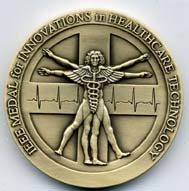IEEE Medal for Innovations in Healthcare Technology
From ETHW
About
The IEEE Medal for Innovations in Healthcare Technology was established in February, 2009.
The IEEE and the IEEE Engineering Medicine and Biology Society have been involved in the life sciences since 1953; the establishment of this medal will promote IEEE as well as past and future contributions to the life sciences field.
Award Recipients
- Ronald Nutt, 2010, “For the design, commercial development and clinical implementation of hybrid PET/CT scanners.”
- David Townsend, 2010, “For the design, commercial development and clinical implementation of hybrid PET/CT scanners.”
- Harrison H. Barrett, 2011, "For pioneering contributions to the foundations and applications of biomedical imaging science.”
- Savio S-Y. Woo, 2012,“For pivotal contributions to biomechanics and its application to orthopedic surgery and sports medicine.”
- Robert S. Langer, 2013, "For pioneering and innovative therapies using micro- and nanoengineering approaches and biomaterial to tissue engineering, drug delivery, and cancer therapeutics."
- Leroy Hood, 2014, "For pioneering contributions to DNA sequencing technologies that revolutionized life and health sciences."
- Takuo Aoyagi, 2015, ""For pioneering contributions to pulse oximetry that have had a profound impact on healthcare.”
- Charles A. Mistretta, 2016, “For the development of imaging instrumentation and techniques that have transformed the diagnosis and treatment of vascular disease.”
- Yulun Wang, 2017, “For pioneering contributions to remotely operated surgical robots and telemedicine devices.”
- Thomas F. Budinger, 2018, "For pioneering contributions to tomographic radiotracer imaging."
- Kamil Ugurbil, 2019, “For pioneering the development and leading the advancement of ultra-high-field MRI technology for biomedical and brain research.”
- Mark S. Humayun, 2020, “For contributions to the treatments of retinal neurodegenerative diseases through the use of prosthetic devices.”
- Ruzena Bajcsy, 2021, “For pioneering and sustained contributions to healthcare technology fundamental to computer vision, medical imaging, and computational anatomy.”
- James G. Fujimoto, 2022, “For pioneering the development and commercialization of optical coherence tomography for medical imaging and diagnostics.”
- Rebecca Richards-Kortum, 2023, "For contributions to optical solutions for cancer detection and leadership in establishing the field of global health engineering"
- Blake S. Wilson and Graeme Clark, 2024, “For contributions to the development of the modern cochlear implant.”
- James J. Collins, 2025, “For contributions to synthetic gene circuits and programmable cells, launching the field of synthetic biology, impacting healthcare applications.”
